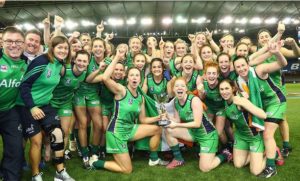International rules apply in Melbourne
More than 850 people from around the world gathered in Melbourne this month to celebrate friendship and football.
The 2017 International Australian Football League (AFL) Cup saw 26 men’s and women’s teams – speaking more than 20 languages – compete over three weeks with Papua New Guinea taking out the championship.
The International Cup has been played every three years since 2002 making the 2017 tournament the sixth competition.
 Expatriate Australians are now eligible to play and teams must be made up by amateurs who must be nationals of the country that they represent.
Expatriate Australians are now eligible to play and teams must be made up by amateurs who must be nationals of the country that they represent.
Around 850 players travelled from overseas to complete in this year’s International Cup through fundraising and sheer determination.
Sixteen of the 30 men in the India team travelled from India to participate, while the remainder of the team are originally from Indian but now call Australia home.
“We were very pleased to welcome players from North America, Europe, Africa, the Middle East, Asia and the Pacific,” said Grant William, head of the AFL Community and International Development unit.
“The International AFL Cup is about bringing people together and is an opportunity to promote our game and support its growth within an International community,” Mr William said.
For the first time, the 2017 International AFL cup introduced a ‘school round’ which is to be played in suburban and country schools giving students from Mount Eliza to Ballarat an opportunity to interactively watch the games.
The men’s grand final was played at the Melbourne Cricket Ground (MCG) whilst the Women’s concluded this year’s cup at the Etihad Stadium giving all players great exposure to the reality of AFL competitions.
During the India Versus Pakistan game, India adapted the Golden Square Club song which is sang to the tune of “It’s a grand old flag”, by changing references from Golden Squares “blue and gold” to India’s “orange and green” aligning with some of their national colours.
“We’re trying to show them how football is part of our culture, but by having them stay in our houses, they really shared their culture with us as well,” Mr William said.
The Papua New Guinea (PNG) men’s team successfully made it to top of the ladder by beating New Zealand by a single point.
The men’s PNG team had previously won the International AFL cup title in 2008 by 8 points and in 2011 by 3 points.
Nauru’s men’s team made it to fifth place beating their record as well as Great Britain’s sixth and France’s tenth place record positions.
Mr William said the AFL was “thrilled” to have eight women’s teams competing in 2017.
The Irish women’s team took out first place followed by Canada in second place.
Magy Mekhaiel












